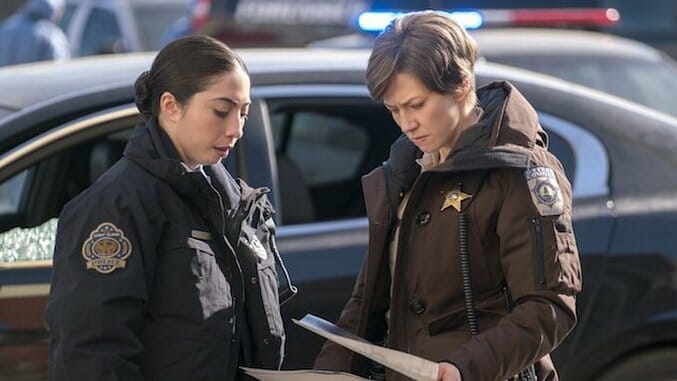Fargo‘s Masterful Finale Offers No Easy Answers to the Season’s Moral Questions
Photo: Chris Large/FX
Early on in The Big Lebowski, after Walter (John Goodman) has assured The Dude (Jeff Bridges) that nobody will cut his dick off, The Stranger, memorably played by Sam Elliott, tosses out an old bit of wisdom for The Dude to chew on. “Sometimes you eat the bar, and sometimes the bar eats you,” he says. The line is part of the film’s exploration of language, karma and the way context can alter perception: The words of wisdom should read as “bear,” not “bar,” but The Stranger’s accent, or perhaps his penchant for obscurity, or perhaps the locale, have The Dude hearing “bar.” Later on, The Dude recites the line as “bar,” one of the many instances in which he absorbs a phrase spoken by someone else and uses it in another context, where perhaps it doesn’t fit.
Of course, The Stranger’s central idea is that life is full of wild and unpredictable swings. What can be relied on one day is absent the next. There’s no such thing as stable or normal, as they’re only illusions we create in order to cope with the vicissitudes that will pester us until the day we die. The third season of Fargo directly referred to this scene in an earlier episode, and ever since the series has been dealing in the themes evident in The Stranger’s words of wisdom. Life has a way of balancing out, but that’s not always a good thing. That means that the good guys win some, but so do the bad guys. Nikki (Mary Elizabeth Winstead) and Mr. Wrench (Russell Harvard) may get the upper hand on Varga’s (David Thewlis) men, sending buckshot through Meemo (Andy Yu), but that also leads to Nikki lying dead in the middle of the road alongside an innocent cop. The universe strikes a balance, but in doing so it sacrifices good people.
What’s emerged across the season, and somewhat falls into place in “Somebody to Love,” is a lingering sense of dread when it comes to this balance, and technology plays a central role in the mounting angst. Essentially, Fargo questions what karmic balance looks like in an age of misinformation, isolation and cultural division amplified by the use of technology. When the tangible no longer exists and facts cannot be agreed upon, how can a fair and moral assessment be made?
The world of this season is one in which the intangible thrives. Stussy Lots makes its money not by crafting anything useful, but by using wealth as a way to buy up property before renting it back to citizens. Varga and his men, when they go to deliver the ransom to Nikki and Mr. Wrench, wander through an unnamed industrial area; it’s a vacant ghost town, the industry gone, with nothing left to replace it—except, perhaps, a parking lot. Even Emmit (Ewan McGregor), someone who benefited greatly from the decline of industry, must reckon with the consequences of the shift away from tangible, real things. When he pulls a gun on Meemo, Varga doesn’t bat an eye. Wealth is the true weapon here, not any firearm or threat of physical attack. Varga already has the Stussy business in his pocket, and he’s already stripped and sold it to the widow Goldfarb, the seemingly dull and forgetful woman revealed to be a major player all along.
-

-

-

-

-

-

-

-

-

-

-

-

-

-

-

-

-

-

-

-

-

-

-

-

-

-

-

-

-

-

-

-

-

-

-

-

-

-

-

-








































